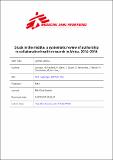Stuck in the middle: a systematic review of authorship in collaborative health research in Africa, 2014–2016
Publication Date
2020Author
H Jeufack, N Neufeld, A Alem, S Sauer, J Odhiambo, Y Boum, M Shuchman, J Volmink
Metadata
Show full item recordAbstract/
Abstract
Background Collaborations are often a cornerstone of
global health research. Power dynamics can shape if and
how local researchers are included in manuscripts. This
article investigates how international collaborations affect
the representation of local authors, overall and in first and
last author positions, in African health research.
Methods We extracted papers on ‘health’ in sub-Saharan
Africa indexed in PubMed and published between 2014
and 2016. The author’s affiliation was used to classify
the individual as from the country of the paper’s focus,
from another African country, from Europe, from the USA/
Canada or from another locale. Authors classified as
from the USA/Canada were further subclassified if the
author was from a top US university. In primary analyses,
individuals with multiple affiliations were presumed to be
from a high-income country if they contained any affiliation
from a high-income country. In sensitivity analyses,
these individuals were presumed to be from an African
country if they contained any affiliation an African country.
Differences in paper characteristics and representation of
local coauthors are compared by collaborative type using
χ² tests.
Results Of the 7100 articles identified, 68.3% included
collaborators from the USA, Canada, Europe and/or another
African country. 54.0% of all 43 429 authors and 52.9%
of 7100 first authors were from the country of the paper’s
focus. Representation dropped if any collaborators were
from USA, Canada or Europe with the lowest representation
for collaborators from top US universities—for these
papers, 41.3% of all authors and 23.0% of first authors
were from country of paper’s focus. Local representation
was highest with collaborators from another African
country. 13.5% of all papers had no local coauthors.
Discussion Individuals, institutions and funders from
high-income countries should challenge persistent power
differentials in global health research. South-South
collaborations can help African researchers expand
technical expertise while maintaining presence on the
resulting research.

